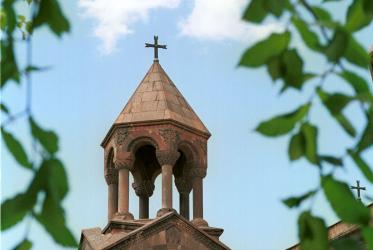Ceremony of the blessing of the Armenian Church of the Holy Muron in Bikfaya, Lebanon:
Your Holiness Aram,
Your Holinesses, Your Beatitudes, Your Eminences, Your Excellences,
Ladies and Gentlemen,
Dear sisters and brothers in Christ,
It is a privilege and a blessing to be present on behalf of the fellowship of the World Council of Churches to participate in this holy act. The Holy Spirit unites the churches through the ages and through all tribulations, and the Holy oil is a marvelous sign of the presence of the Spirit in the Armenian Church and people.
The blessing of the Holy Muron comes today as an affirmation and a message to the world that no earthly power threatens our Christian faith.
We are gathered 100 years after the Armenian genocide, brutal and violent actions that caused the death of up to 1.5 million of the Armenian people in a short period of time.
We are gathered in a region that is facing new levels of brutality, crimes against humanity, systems of injustice, of poverty, of lack of ability and willingness to overcome conflicts through political and diplomatic processes. Every day, thousands are fleeing from their homes in Syria and Iraq, close to where so many Armenians lost their lives 100 years ago. The recent agreement on nuclear power with the Iranian government offers some hope of diplomatic efforts towards peace for the peoples of Syria and Iraq. We pray that this fragile hope may be strengthened, that this agreement may be a beginning of new dynamics in the region.
We are gathered in a country that hosted thousands of survivors of the Armenian genocide, a country that hosted the orphans, the women, the elderly: the Church. A country that witnessed wars, conflicts but also peace and reconciliation. Today, 100 years after, Lebanon continues hosting hundreds of thousands of the survivors of the wars in Syria and in Iraq.
For all these reasons, the blessing of the Holy Muron today acquires a greater level of sanctity. It symbolizes the perfection of virtues that we receive through the Holy Spirit. It also symbolizes resurrection and spiritual renewal of the people of faith. Today as we celebrate the life of our churches, we also remember and honour the martyrs of the Armenian genocide as human beings, much more than mere victims. Their lives are holy to God, their creator. Their dignity is not reduced but affirmed through their death in faithfulness and sacrifice. The Armenian people of today, together with these martyrs, are witnesses to the truth of human depravity and death. Even more, you are also witnesses to the life of your people and the power of God to create new life.
I have participated this year in several events commemorating the Armenian Genocide, in Etchmiadzin and in Yerevan, and in Washington, D.C. Those events, and the meaningful time we share in these days, give me the opportunity to witness the living hope and faith of the Armenian people everywhere in the world. The presence of the church and the people of Armenia today is a sign of the power of the triune God, the creator, the resurrected and the giver of life, as we see not only survival but a determination to claim the fullness of life that God desires for each human being. The memory of the victims moves us to take pro-active measures to stop all attacks against humanity and our dignity. Together we must use the opportunities and instruments of international law and cooperation we have for learning, knowing and naming the truth, for reconciliation, for justice and for peace. It is possible to act together to prevent and to protect.
The World Council of Churches, with its 345 member churches and half a billion Christians in more than 110 countries, has called the ecumenical movement and all people of good will to join together in a Pilgrimage of Justice and Peace. This is a pilgrimage of faithful conviction, defined by the unity to which God calls the church, humanity and all of creation. You are all invited to join this pilgrimage. Let us together explore and celebrate the deep meaning and richness of peace. Let us commit ourselves to promote life and the dignity of all. Let us, in this pilgrimage, be ourselves transformed by the God of Life that we may be instruments of transformation in places of conflict and hurt in the world.
Dear sisters and brothers, we are called to hope through the resurrection of Christ. We are called to be witnesses and ambassadors to life. Today we are also called by St. Gregory the Illuminator, the Father of the Armenian Church, to holiness, to a life of spirituality and virtue. Let us respond to this call and walk together in our journey of Faith.
Amen.
Rev. Dr Olav Fykse Tveit
WCC general secretary



